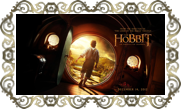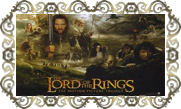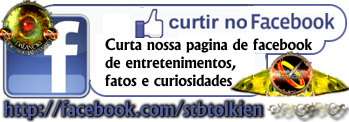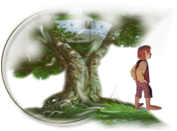

| "The uniqueness of Tolkien's involvement, as an imaginative writer, with the English language lies in his capacity to work from within the actual or potential development of any given word. In this intimate and active involvement with the histories of words, we can imagine Tolkien, perhaps, as an Ent in the forest of language, waking up old words that had fallen asleep — or, in the case of words taken from Old Norse, encouraging transplants to put down roots in new soil." - Robert Wilfred Franson (1) J.R.R. Tolkien is very famous for his The Hobbit and Lord of the Rings, some even know his other book the Silmarillion and that he was professor at Oxford. He is however less well known as a sub-editor to a work at least as important and maybe more influential then The Lord of the Rings, namely the "Oxford English Dictionary". In fact at the age of 24 J.R.R. Tolkien joined the dictionary's staff for two years, and said about this period: "I learned more in those two years than in any equal period of my life." What he learned was dictionary-making and the lexicographer's way looking at the history of certain words, but his word endeavors also fired his imagination - and we all know the result! |
The Ring of Words: Tolkien and the Oxford English Dictionary was already in the list of finalists to win the Mythopoeic Scholarship Award in Inklings Studies, was positively reviewed in the Times Literary Supplement and The Chronicle - it also has made it into a paperback edition. Published by The Oxford University Press it once again looks very fabulous. It has a very nice size, high quality cover and printing - together with the nice cover design, interesting content and nice illustration it is a book that really invites to be read!
In The Ring of Words: Tolkien and the Oxford English Dictionary, Peter Gilliver, Jeremy Marshall, and Edmund Weiner have examined Tolkien's contributions to the OED, and they are in a perfect position to do so: they are among the current editors of the dictionary themselves. They wanted to write the book "to examine Tolkien's word-hoard with a lexicographer's eye." J.R.R. Tolkien is a philologist as well as a novelist, and a philologist first. Without his love of words and their scholarly histories, there would have been no Elvish languages created, no peoples of Middle-earth, and no great novels.
The authors were able to examine the actual scraps of paper on which Tolkien wrote drafts for definitions and etymologies of words (primarily beginning with W) to be included in the OED. To an outsider such work could seem tedious in the extreme, but since the authors are as fascinated by the origins and developments of words as Tolkien was himself, they help us see how intriguing such work can be. Anyone interested in either the history of the imaginary Middle-earth or the great dictionary will find richness here. Soon you will see that there is no word-book and no word-history to match the Oxford English Dictionary.
This little book (229 pages plus bibliography and index) is a treasure, literally a mathom amongst the works on Tolkien. It works both as a referenece book to explore the meaning of significant words and an enjoyable read just to further your understanding of language. The books has three sections:
Tolkien as Lexicographer
The first part deals with Tolkien's brief but productive period working on the Oxford English Dictionary. In miniature, we see here how the OED was built over half a century under its principal editors: James Murray, Henry Bradley, William Craigie, and Charles Onions. Craigie was Tolkien's tutor in Old Norse before the War, and Tolkien's special contributions to the OED are in words with Germanic roots and relatives of Old and Middle English words. The assembly of an etymological dictionary has deeper challenges than that of a dictionary only of contemporary usage. If you don't yet know of the puzzles and surprises in the intricate history of English, this is a fine introduction.
Tolkien as Wordwright
The second part begins with Tolkien's ability to reconstruct ancestral and missing-link forms of words, seeing parallels particularly in the other North European languages. This scholarly but creative lexicographic skill is one of the foundation blocks of Tolkien's great gift of novel-writing. Tolkien's fun with word-creation as well as his deep expertise shine through The Ring of Words. This section brings new light to Tolkien's deep knowledge of Anglo-Saxon and other ancient tongues, and to his readings of such authors as William Morris and H.R. Haggard, among many others. Here the reader recognizes anew that Tolkien's chosen career of philology was not just his job, but also his passion.
Word Studies
The last part is not just a word-list, but rather short studies and histories of some of the terms, a paragraph up to several pages for each. Carrock, Beorn's place, the fabulous giant ents; mathom, early adopted by fans; weapontake, the taking up of laid-aside arms; and so on. There are sometimes archaic terms like nuncheon and sometimes words developed by Tolkien himself such as eucatastrophe and legendarium, which have now entered the English language. Here are examined wraith, confusticate, eleventy-one, and orc. "Hobbit" is here, of course, a word that everyone associates with Tolkien but one which he modestly said he was not sure he had invented, although he could not otherwise account for it. Indeed, in 1977, an obscure list of fantastical creatures published by a folklorist in 1895 included "hobbit" (as well as beings called "boggleboes".) Some of Tolkien's words will never wander outside of literary fantasy, but even these, the authors show, are being widely used in new fantasy novels and by role-playing gamers. Some will justly be getting wider circulation. One I liked is "staggerment": "To say that Bilbo's breath was taken away is no description at all. There are no words left to express his staggerment."
Throughout, the authors provide thoughtful examples not only of diligent word-histories but of word-play; and references not only to The Hobbit and The Lord of the Rings, but to other Tolkien work such as Farmer Giles of Ham and his editions of Sir Gawain and the Green Knight. There are parallels and contrasts from Beowulf and William Shakespeare and William Morris up through W. H. Auden and C. S. Lewis. And plenty of references from the Oxford English Dictionary.
I find Tolkien's parallel building of his world and word-hoard interesting and entertaining in their own right as well as evocative back-stories to The Lord of the Rings. Gilliver, Marshall, and Weiner clearly know and love the genius of Tolkien as they know and love their OED, and in The Ring of Words they do an excellent job of sharing that glorious intersection.
This is a scholarly but highly accessible work which will be appreciated by Tolkien scholars and anyone else who loves the English language. The authors have produced a book that is effortless to read, appealing to the layman as much as an academic. I would happily reccomend this book to any Tolkien enthusiast.
| The Ring of Words: Tolkien and the Oxford English Dictionary Type: PaperbackEstimate: 256 pagesPublisher: Oxford University PressPublication date: 27 August 2009 ISBN-10: 0199568367ISBN-13: 978-0199568369 |
Sources:(1) Review by Robert Wilfred Franson for troynovant.com(2) Review by Penny Deutz for Amazon (3) Tolkien, the _OED_, and the Love of Words by Rob Hardy
Spread the news about this J.R.R. Tolkien article:
Read more http://goo.gl/rfZKPf














